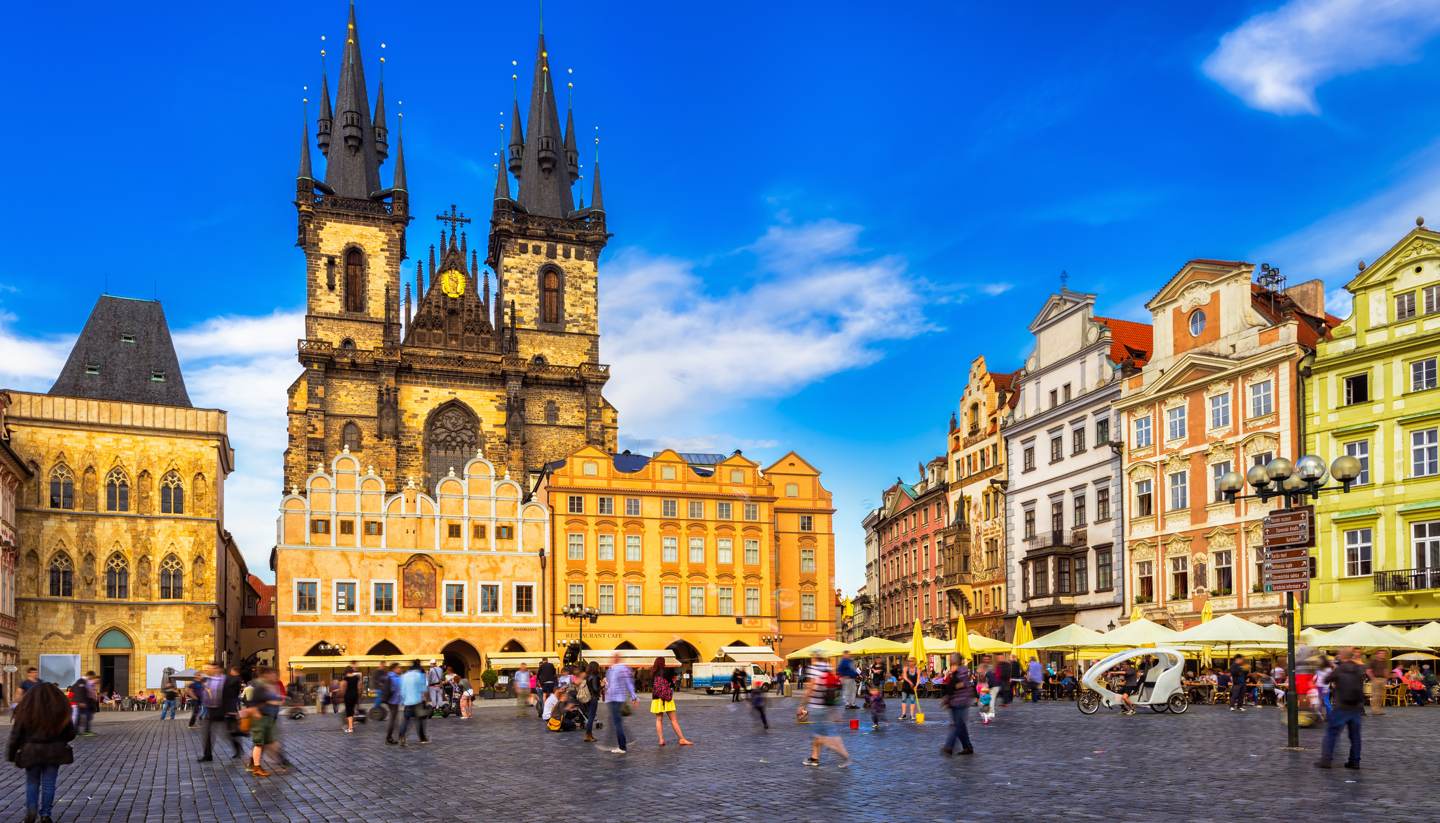Czech Republic travel guide
About Czech Republic
A historic jewel at the heart of Europe, the Czech Republic packs a sizeable punch for such a small country; from majestic castles to medieval towns, elegant spa resorts to scenic national parks, it has much to offer international visitors. It is also, lest we forget, the birthplace of the world’s finest beer.
At the heart of it all is the culture-crammed capital, Prague. Dubbed the “city of a thousand spires,” it comprises beautiful churches, cobbled lanes and medieval bridges, all watched over by a fairytale castle. Add to that a mix of ancient monuments, fine dining, old breweries, bustling markets and lively jazz clubs. There really is never a dull moment.
Yet those who fail to venture beyond the city boundaries are truly missing out. Located just a short drive from the capital are some extraordinary attractions; the hot springs of Karlovy Vary; the giant gothic castle of Karlštejn; the church made of human bones in Kutná Hora; and the city of Plzeň, where pilsner beer was born.
Formerly part of Czechoslovakia, since the Velvet Divorce of 1993 – when Slovakia and the Czech Republic parted company – the latter has emerged the more popular with tourists. And to understand its appeal one must consider its assets; the stunning wine-growing region of Monrovia, home to rolling hills, traditional food and the spirited cities of Brno and Olomouc; the snow-capped mountains of Krkonoše; the otherworldly rock formations of Český Ráj; the wild forests of Šumava National Park; and the historic town of Český Krumlov, a fully deserving UNESCO World Heritage Site.
And yet, for all this, the Czech Republic is far more than the sum of its sights. This is a nation of proud, forthright and friendly people, eager to take a significant role on the European stage. It may only be a small country – and a relatively new one – but the Czech Republic leaves a big impression.
Key facts
78,866 sq km (30,450 sq miles).
10,550,085 (UN estimate 2016).
135 per sq km.
Prague.
Republic.
President Petr Pavel since 2023.
Prime Minister Andrej Babis since 2017.
Travel Advice
Before you travel
No travel can be guaranteed safe. Read all the advice in this guide. You may also find it helpful to:
- see general advice for women travellers
- read our guide on disability and travel abroad
- see general advice for LGBT+ travellers
- read about safety for solo and independent travel
- see advice on volunteering and adventure travel abroad
Travel insurance
If you choose to travel, research your destinations and get appropriate travel insurance. Insurance should cover your itinerary, planned activities and expenses in an emergency.
About FCDO travel advice
The Foreign, Commonwealth & Development Office (FCDO) provides advice about risks of travel to help you make informed decisions. Find out more about FCDO travel advice.
Get travel advice updates
Sign up to get email notifications when this advice is updated.
Follow FCDO:
This information is for people travelling on a full ‘British citizen’ passport from the UK. It is based on the UK government’s understanding of the current rules for the most common types of travel.
The authorities in the Czech Republic set and enforce entry rules. If you’re not sure how these requirements apply to you, contact the Czech Embassy in the UK.
Passport validity requirements
The Czech Republic follows Schengen area rules. Your passport must:
- have a ‘date of issue’ less than 10 years before the date you arrive – if you renewed your passport before 1 October 2018, it may have a date of issue that is more than 10 years ago
- have an ‘expiry date’ at least 3 months after the day you plan to leave the Schengen area (the expiry date does not need to be within 10 years of the date of issue)
Check with your travel provider that your passport and other travel documents meet requirements. Renew your passport if you need to.
You will be denied entry if you do not have a valid travel document or try to use a passport that has been reported lost or stolen.
Visa requirements
You can travel without a visa to the Schengen area, which includes the Czech Republic, for up to 90 days in any 180-day period. This applies if you travel:
- as a tourist
- to visit family or friends
- to attend business meetings, cultural or sports events
- for short-term studies or training
The requirements for working in the Czech Republic are different.
If you’re travelling to other Schengen countries as well, make sure your whole visit is within the 90-day limit. Visits to Schengen countries in the 180 days before you travel count towards your 90 days. If you overstay the 90-day visa-free limit, you may be banned from entering Schengen countries for up to 3 years.
Make sure you get your passport stamped on entry and exit.
If you’re a visitor, border guards will look at your entry and exit stamps to check you have not overstayed the 90-day visa-free limit for the Schengen area.
If your passport is missing a stamp, show evidence of when and where you entered or left the Schengen area (for example, boarding passes or tickets) and ask the border guards to add the date and location in your passport.
At the Czech Republic border control, you may also need to:
- show a return or onward ticket
- prove that you have enough money for your stay – the amount varies depending on your accommodation
Staying longer than 90 days in a 180-day period
To stay longer, you must meet the Czech government’s entry requirements. Check which type of visa or permit you need with the Czech Embassy in the UK.
If you stay in the Czech Republic with a residence permit or long-stay visa, this does not count towards your 90-day visa-free limit.
Read about passport stamping if you live in the Czech Republic.
New Schengen entry requirements
The EU’s Entry/Exit System (EES) is expected to start in October 2025. It is not currently in operation. The European Union will inform about the specific start date of the EES before its launch.
Read more information on the EU Entry/Exit System.
Border controls at Germany’s land borders
There are temporary border controls in place to travel into Germany. Check the entry requirements for Germany.
Vaccine requirements
For details about medical entry requirements and recommended vaccinations, see TravelHealthPro’s Czech Republic guide.
Registering with the police
If you do not have a Czech Republic residence permit, you must register your address with the nearest foreign police department (in Czech) within 3 days of arriving. You can also register through your hotel or accommodation service. If you do not register, you could get a fine of up to 3,000 Czech koruna.
Customs rules
There are strict rules about goods that can be brought into and taken out of the Czech Republic. You must declare anything that may be prohibited or subject to tax or duty.
Taking food into the Czech Republic
You cannot take meat, milk or products containing them into EU countries. There are some exceptions such as powdered baby milk, baby food and special foods or pet feed required for medical reasons.
Taking money into or out of the Czech Republic
Declare cash or travellers cheques if the value is 10,000 euros or more. You will get a certified declaration to show you brought it in with you. If you do not, your money could be seized when you leave. For more information, see import and export of financial funds.
Terrorism
There is a high threat of terrorist attack globally affecting UK interests and British nationals, including from groups and individuals who view the UK and British nationals as targets. Stay aware of your surroundings at all times.
UK Counter Terrorism Policing has information and advice on staying safe abroad and what to do in the event of a terrorist attack. Find out how to reduce your risk from terrorism while abroad.
Terrorism in the Czech Republic
Terrorist attacks in the Czech Republic cannot be ruled out.
You should be aware of the global risk of indiscriminate terrorist attacks which could be in public places, including in places frequented by expatriates and foreign travellers.
Political situation
Public protests may happen at short notice. These have been peaceful but take care in crowded places and follow the instructions of local authorities.
Crime
Protecting yourself and your belongings
Petty theft is a problem, especially in major tourist areas in Prague. There is a risk of pickpocketing:
- on busy metro and bus routes from Prague airport to the city centre
- on trams to popular tourist sites like Prague Castle
- in busy tourist areas
Take care of yourself and your belongings in the same way as you would do in the UK. Avoid leaving your belongings unattended.
Report thefts in person to the Czech police within 24 hours, and get a police report crime number for insurance purposes. Prague police station (Jungmannovo namesti 9, Prague 1, nearest metro stop is Mustek) is open 24 hours and has English translators. You can also get a police report from the police station at the airport. See Prague police station contact details (in Czech).
Every lamppost in Prague has a 6-digit number posted at eye level. These codes will help you tell the police where you are if you cannot give them an exact address.
Drink spiking
There is a risk of drink spiking in bars and clubs. Be careful not to take drinks from strangers or leave your drinks unattended.
Scams
Beware of criminals pretending to be plainclothes policemen who ask to see your foreign currency and passport. Czech Republic police officers do not have the right to do this. Do not show them your money. Instead, offer to go with them to the nearest police station. You can also call 158 or 112 to check their identity.
Travelling in groups
If you’re travelling in a group, keep a note of your hotel phone number and address in case you are separated. Leave contact details with a friend or relative in the UK.
Prague safety issues
Prague city police advise visitors to:
- always change money at a currency exchange or bank rather than on the street as this money is often counterfeit
- take care when using cash machines
- avoid contact with sex workers
- be aware of consumption charges in night clubs as they are often high
- be careful with consumption cards, which carry high financial penalties if you lose them before you pay your bill
Laws and cultural differences
Personal ID
It is a legal requirement to carry ID. Always carry your passport. The police may fine or arrest you if you do not. They will normally accept a scan of your passport if you have not committed a crime.
Drunken and offensive behaviour
Stag groups are not allowed to enter some city centre bars and restaurants. You may be arrested or fined for drunken or offensive behaviour. Police may take you to ‘sober-up’ facilities for a temporary period, and you will have to pay for your stay.
Illegal drugs
The possession, sale and distribution of drugs is illegal, and the drugs are often dangerous counterfeits. Penalties for drug offences are severe. Convictions carry sentences of up to 18 years. Some shops, particularly in Prague, advertise ‘cannabis products’, which contain trace amounts of THC permissible under Czech law. However, possessing marijuana remains illegal in the Czech Republic.
LGBT+ travellers
Same-sex relationships and civil partnerships are legal in the Czech Republic, but same-sex marriages are not recognised in Czech law. Registered same-sex partnerships are awaiting presidential approval. Same-sex couples showing affection in public could receive unwanted attention. Read more advice for LGBT+ travellers.
Surrogacy
It is illegal to earn money from a surrogacy arrangement.
The police may charge you if you are:
- a surrogate mother
- a British national who plans to take a child born through surrogacy
- an agent organising the handover
FCDO advises against making surrogacy arrangements in the Czech Republic or moving surrogacy arrangements from other countries.
You should get specialist legal advice in the UK and the Czech Republic. See surrogacy arrangements in foreign countries.
Transport risks
Road travel
If you are planning to drive in the Czech Republic, see information on driving abroad and check the rules of the road in the RAC’s Czech Republic guide. The guide lists driving regulations and other legal requirements you need to be aware of.
You can use a UK photocard driving licence to drive in the Czech Republic. If you still have a paper driving licence, you may need to update it to a photocard licence or get the correct version of the international driving permit (IDP) as well.
Hire car companies often have stricter requirements for their customers, such as a year of driving experience, a higher minimum age and holding an IDP.
Check if you need a UK sticker to drive your car outside the UK.
Drink-driving is a serious offence in the Czech Republic. If you are tested and found to have any alcohol or drugs in your system, you may face a fine of up to 50,000 Czech koruna, confiscation of your licence and possible imprisonment. The Czech police can ask any driver to take a breathalyser test on the spot.
Taxis
It’s safer to use a major taxi company than to pick one up in the street. Some taxis charge high prices. Always check the rates on the side of the taxi before getting in.
Beware of drivers pretending to be taxi services but offering rides in unmarked cars and overcharging for journeys. See information on using Uber at Prague airport, including how to book through the app, at a self-service kiosk or at service counters. Booking through a kiosk is usually slightly more expensive.
Buses and trams
See Prague public transport information and journey planner in English.
Be careful near tram tracks and make sure you look both ways as trams cannot stop quickly. Trams have the right of way on zebra crossings.
You may get a fine if you do not cross roads and tram tracks at pedestrian crossings. You can also get a fine if you cross when the pedestrian crossing light is not green.
You must validate your ticket in a ticket machine before starting a journey on public transport. You do not need to validate tickets bought from self-service terminals on trams and buses. Officials patrol public transport and will issue an on-the-spot fine of 1,000 Czech koruna (around £35) if you do not hold a validated ticket. If fined, you should get a receipt. If you cannot pay immediately, the police can get involved and the fine could increase to 1,500 koruna.
The 30 and 90-minute journey adult tickets for bus, tram and metro are not valid on the Petřín Hill funicular railway in Prague. You need a specific 60-koruna ticket from the vending machines at funicular railway stops, or a 24-hour ticket (or longer).
Before you travel check that:
- your destination can provide the healthcare you may need
- you have appropriate travel insurance for local treatment or unexpected medical evacuation
This is particularly important if you have a health condition or are pregnant.
Emergency medical number
Dial 112 and ask for an ambulance.
Contact your insurance or medical assistance company quickly if you’re referred to a medical facility for treatment.
Vaccine recommendations and health risks
At least 8 weeks before your trip:
- check the latest vaccine recommendations for the Czech Republic
- see where to get vaccines and whether you have to pay on the NHS travel vaccinations page
See what health risks you’ll face in the Czech Republic.
Medication
The legal status and regulation of some medicines prescribed or bought in the UK can be different in other countries.
Read best practice when travelling with medicines on TravelHealthPro.
Healthcare in the Czech Republic
FCDO has a list of medical providers in the Czech Republic where some staff will speak English.
Health insurance cards
To get medically necessary state healthcare in the Czech Republic, you need a Global Health Insurance Card (GHIC) or a European Health Insurance Card (EHIC).
The NHS’s getting healthcare abroad webpage has details about:
- how to apply for a GHIC
- how to get temporary cover if you lose your card or it does not arrive in time
- who qualifies for a new EHIC instead of a GHIC
- what treatment counts as medically necessary
A GHIC or EHIC is not an alternative to travel insurance. You may have costs your GHIC or EHIC does not cover, including:
- changes to travel and accommodation bookings
- additional standard costs for treatment
- medical repatriation to the UK
- treatment that is ruled non-urgent
- private healthcare
- private clinics
There is also guidance on healthcare if you’re living in the Czech Republic.
Travel and mental health
Read FCDO guidance on travel and mental health. There is also mental health guidance on TravelHealthPro.
The Foreign, Commonwealth & Development Office (FCDO) cannot provide tailored advice for individual trips. Read this travel advice and carry out your own research before deciding whether to travel.
Emergency services in the Czech Republic
Telephone: 112 (ambulance, fire, police)
Contact your travel provider and insurer
Contact your travel provider and your insurer if you are involved in a serious incident or emergency abroad. They will tell you if they can help and what you need to do.
Refunds and changes to travel
For refunds or changes to travel, contact your travel provider. You may also be able to make a claim through insurance. However, insurers usually require you to talk to your travel provider first.
Find out more about changing or cancelling travel plans, including:
- where to get advice if you are in a dispute with a provider
- how to access previous versions of travel advice to support a claim
Support from FCDO
FCDO has guidance on staying safe and what to do if you need help or support abroad, including:
- finding English-speaking lawyers, funeral directors and translators and interpreters in the Czech Republic
- dealing with a death in the Czech Republic
- being arrested or imprisoned in the Czech Republic
- getting help if you’re a victim of crime
- what to do if you’re in hospital
- if you’re affected by a crisis , such as a terrorist attack
Contacting FCDO
Help abroad
See how to get help from the UK government abroad including in an emergency.
Help in the UK
You can call FCDO in London if you need urgent help because something has happened to a friend or relative abroad.
Telephone: 020 7008 5000 (24 hours)
Get travel advice updates
Sign up to get email notifications when this travel advice is updated.
Follow FCDO:
Risk information for British companies
The Overseas Business Risk service offers information and advice for British companies operating in the Czech Republic on how to manage political, economic, and business security-related risks.





